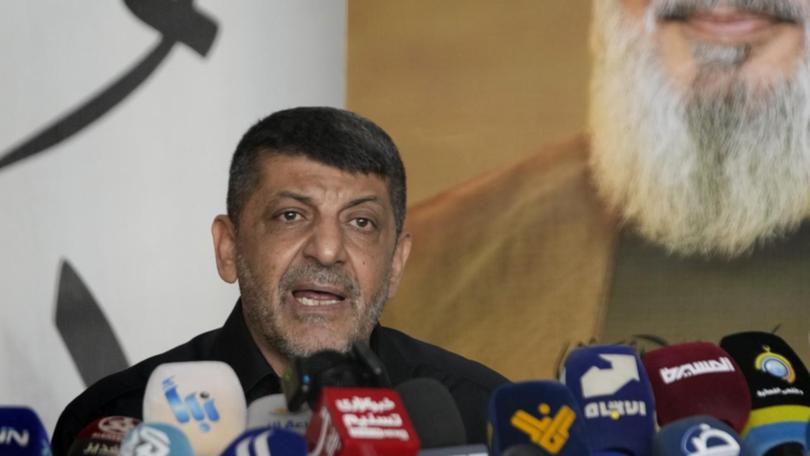‘Unable to rearm’: Israel cites conditions for Lebanon ceasefire as US take lead diplomacy role
Israeli Foreign Minister Gideon Saar says his country is working with the United States on a ceasefire in Lebanon with strict conditions on Hezbollah’s ability to rearm.

Israel says there is progress in talks about a Lebanon ceasefire and has indicated Russia could play a part by stopping Hezbollah from rearming via Syria, although the group says it has not received any new truce proposals.
Pummelled by Israel’s offensive, Hezbollah said political contacts were underway involving its backers in Iran, the US and Russia whilst also saying it had enough weapons for a “long war” and keeping up rocket fire into Israel.
In Jerusalem, Israeli Foreign Minister Gideon Saar said the war against Hezbollah was not yet over.
Sign up to The Nightly's newsletters.
Get the first look at the digital newspaper, curated daily stories and breaking headlines delivered to your inbox.
By continuing you agree to our Terms and Privacy Policy.The main challenge facing any ceasefire deal would be enforcement, he said, although there was “a certain progress” in talks.
After previous rounds of fruitless US-led diplomacy to secure a Lebanon truce, the comments indicate renewed focus on the issue as President Joe Biden prepares to leave office in January, with president-elect Donald Trump set to replace him.
Hopes of a truce in the Gaza Strip have meanwhile suffered a setback, with Qatar suspending its mediation role.
Ignited by the Gaza war, the conflict at the Lebanese-Israeli border had been rumbling on for a year before Israel went on the offensive in late September, pounding wide areas of Lebanon with air strikes and sending troops into the south.
Saar, addressing a Jerusalem news conference, said Israel was working with the United States on a ceasefire in Lebanon.
Israel wants Hezbollah north of the Litani river - 30km from the border - and unable to rearm, he said.
Saar said a basic principle for any agreement had to be that Hezbollah would not be able to bring weapons into Lebanon from Syria.
“It is vital to the success of any arrangement in Lebanon,” he said.
“And the Russians are, as you know, present in Syria. And if they are in agreement with this principle, I think they can contribute effectively to this objective.”
Russia deployed forces into Syria nearly a decade ago to support President Bashar al-Assad in the civil war there.
Hezbollah also sent fighters to help Assad, and carved out big sway on the ground alongside other Iran-backed groups.
Syria is widely seen as a major conduit for Iran to supply weapons to Hezbollah in Lebanon, and Israel has struck targets in Syria regularly during the conflict.
An Israeli air strike temporarily cut Syria’s main Homs-Damascus highway on Monday, Syrian media reported.
In Lebanon, relatives held funerals for 20 people killed in a strike on the southern town of Deir Qanoun-Ras al-Ain, including seven medics from rescue groups affiliated with Hezbollah and its Shi’ite ally Amal.
The Israeli military said more than 150 rockets were fired from Lebanon into Israel.
One barrage set fire to parked cars and a building in a Haifa suburb.
Three people suffered moderate and light wounds, the Israeli ambulance service said.
In Beirut, Hezbollah official Mohammad Afif linked intensified political contacts to the looming change of US leadership.
“There is a great movement between Washington and Moscow and Tehran and a number of capitals,” he said.
“We hear a lot of talk but so far, according to my information, nothing official has reached Lebanon or us in this regard,” he told a news conference.
The contacts were “in the phase of testing the waters and presenting initial ideas”.
Israeli Minister of Strategic Affairs Ron Dermer was due to meet US Secretary of State Antony Blinken on Monday in Washington DC, the State Department said.
The Israel Hayom newspaper reported on Sunday that substantial progress has been made in diplomatic negotiations over a proposed Lebanon ceasefire that would require Hezbollah to withdraw north of the Litani River, barring its military presence near the Israeli border, while the IDF would return to the international border.
Yedioth Ahronoth, Israel’s best-selling newspaper, reported on Monday that Israel and Lebanon have exchanged drafts through US envoy Amos Hochstein, signalling progress in efforts to reach a final agreement.
The Lebanese government, which includes Hezbollah, has repeatedly called for a ceasefire based on the full implementation of a United Nations Resolution that ended a war between the group and Israel in 2006.
The resolution calls for the area south of the Litani river to be free of all weapons other than those of the Lebanese state.
